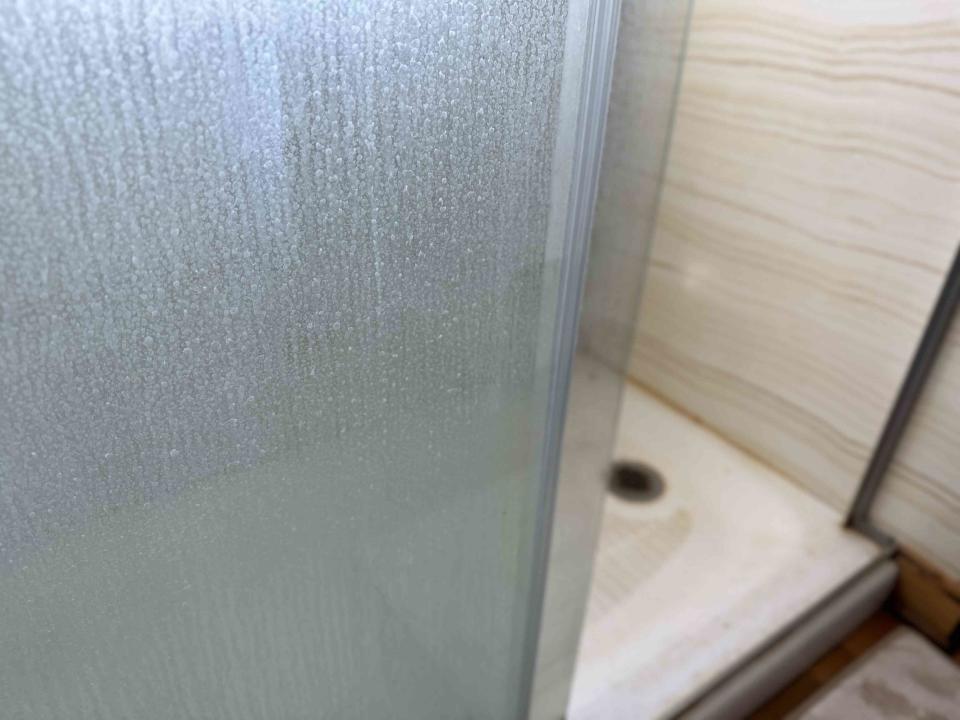How To Remove Hard Water Stains From Glass Surfaces
Your household glass cleaner won't cut it for hard water stains.

Douglas Rissing/Getty Images
In the scope of housework, hard water stains are high on the list of public enemies in my home. Because we live in a place with hard water, they're devilishly difficult to remove (and incredibly quick to appear). But fear not: By the time you're done reading, you'll be better equipped to make your shower doors sparkle and shine.
First, a little science!
All city water begins as hard water. In some municipalities, the city makes the decision to treat water with a water softening system, removing excess magnesium, calcium, and other minerals from water before it reaches your home. Soft water has lots of benefits: It can reduce mineral buildup in your pipes, keep your hair and skin properly hydrated, and keep your water-based appliances running longer and more smoothly.
Hard water, while not dangerous to use, does have its drawbacks. The nastiest and least aesthetic of them is what we're here to discuss: left to dry on shower doors, the water evaporates, but the extra minerals don't. Those small deposits build up over time, and eventually you've got a glass surface littered with spots that never seem to come off no matter how much Windex you use.
And that's because Windex can't work on water stains. Why? Because, in order to truly remove those water spots, you need a highly acidic cleaner. Household glass cleaners like Windex are formulated to be more gentle on your windows and other glass surfaces. To tackle hard water spots, you'll need a low pH cleaner (low pH = high acid!) that can get in there and do your dirty work.
Related: 15 Mistakes To Avoid When Cleaning Your Bathroom

Before Getting Started
Consider the safety of your project. It's wise to wear rubber gloves when dealing with any kind of acidic cleaning project, so while you're assembling your other materials, it's prudent to toss those in, too!
You'll Need:
Depending on your method of choice:
White vinegar
Lemons or lemon juice
Warm water
Spray bottle
Rough towel
Microfiber cloth
Commercial cleaner
Method 1: Vinegar Soak
Fill a spray bottle with equal parts warm water and vinegar.
Spray the affected area thoroughly with your solution. Don't be shy - really get in there and coat it. After letting it soak for few minutes, re-apply, paying special attention to any problem areas.
Use a rough towel to scrub at the water stains. The texture on the towel will help loosen and remove water spots. Note: It shouldn't be a strain to remove the spots at this point – if it is, start from the beginning and let your solution soak longer.
Wipe away the solution with a clean towel or microfiber cloth. If you're able, you can rinse the area with warm water and wipe dry.
Related: 5 Things You Should Never Clean with Vinegar
Method 2: Lemon Juice Solution
Grab 1 or 2 whole lemons. Start by rolling them on a countertop with a decent amount of pressure; doing so helps release the lemon juice from its membranes.
Slice your lemon(s) in half, across the widest part of the lemon. You'll know you've done it right if each of your lemon halves is round in appearance as opposed to almond shaped. Slicing this way makes the lemons easier to palm.
Use one half of your lemon as a natural abrasive and sponge at at the same time! The lemon juice acts as an acid to help remove hard water, while scrubbing in circular motions with the lemon itself helps lift stains in the same way a towel or sponge might.
Rinse or wipe your glass surface with warm water and a clean towel.
Note: Alternately, you can mix equal parts lemon juice with water as in Method 1.
Method 3: Commercial Glass Cleaner
Select the glass cleaner of your choice. Remember: you're looking for something low-pH, high-acid.
Follow the instructions on your product's label.
Note: With commercial glass cleaners, chemicals are more often at play. Ensure you have rubber gloves before starting this process. Safety first!
For more Southern Living news, make sure to sign up for our newsletter!
Read the original article on Southern Living.

